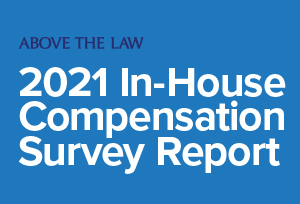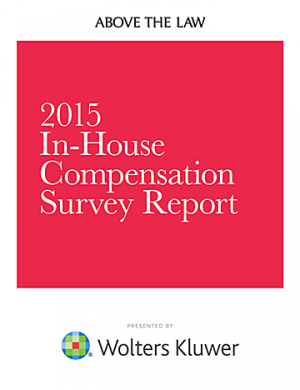Tag: Corporate Counsel
-
 In-House Counsel, Sponsored Content
In-House Counsel, Sponsored ContentThe 2022 In-House Compensation Report Is Here!
Our most robust survey to date takes you inside the black box of corporate counsel pay. -
 In-House Counsel, Sponsored Content
In-House Counsel, Sponsored ContentHow Much Do In-House Lawyers Make?
We surveyed more than 1,600 attorneys to find out. The results of our latest In-House Counsel Compensation Survey are now available.  Sponsored
SponsoredLeaving Your In-House Role: You Don’t Need A Portable “Book” To Be Successful
In-house legal roles have traditionally offered more accommodating schedules and greater opportunities to gain valuable business experience. Now though, the calculus may be changing. With…-
 In-House Counsel, Sponsored Content
In-House Counsel, Sponsored ContentHow Legal Departments Can Benefit From Legal Tech Innovations To Improve Business Processes
Learn how corporate legal departments are using technology to drive innovation, manage costs, and do more with less.
-
 In-House Counsel
In-House CounselHow Much Do In-House Counsel Make? Download Our Free Report!
Have a look inside the black box of corporate counsel pay. -
 In-House Counsel, Litigation Finance, Sponsored Content
In-House Counsel, Litigation Finance, Sponsored ContentTurning The Law Department Into A Profit Center
Bringing business discipline to the legal function. -
 In-House Counsel, Sponsored Content
In-House Counsel, Sponsored ContentIncrease Your In-House Legal Efficiency: 2018 Corporate Legal Department Efficiency Report
This study examines how legal departments are making the most of the resources available to them, especially in terms of keeping work in-house. -
 In-House Counsel, Money
In-House Counsel, MoneyDownload Your Free Copy Of ATL’s In-House Compensation Report
Findings from our 2017 survey of corporate legal departments. -
 In-House Counsel, Rankings
In-House Counsel, RankingsThe Best Legal Departments Of 2017? Maybe?
If you're going to throw around the word "best," you should be able to back it up.  Sponsored
SponsoredWhat Do Millennials Think Of Law Firm Life?
We want to know your views on law firm policies and culture.-
 Morning Docket
Morning DocketMorning Docket: 09.30.16
* According to a labor relations suit filed in 2012, Donald Trump allegedly wanted to fire female employees of Trump National Golf Club in California, who he didn’t think were pretty enough. The suit was settled without any admission of wrongdoing. [Los Angeles Times]
* Biglaw mega-merger alert: Word on the street is that London-based firms CMS and Olswang will join with international firm Nabarro for a three-way merger that would create a combined entity with more than 3,000 lawyers. If the merger were to go through, the firm would have more than $1.5 billion in revenue. [LegalWeek]
* According to the results of this survey, corporate counsel don’t think too highly of millennials when it comes to loyalty. Almost 70 percent of baby boomers and Gen Xers thought millennial lawyers in their legal departments would leave in less than five years, potentially causing “major problem[s]” in terms of turnover rates. [WSJ Law Blog]
* How many women serve as lead counsel in New York state and federal courts and in mediation and arbitration? That’s what a new study being conducted by the New York State Bar Association’s Commercial and Federal Litigation Section hopes to find out, because “[o]nce you have a diagnosis, you can get to a solution.” [New York Law Journal]
* “Something is going wrong at this bank, and you are the head of it. You should be fired.” Wells Fargo CEO John Stumpf may be forfeiting $41 million in pay, but lawmakers were still pretty darn upset with him when he testified before the House Financial Services Committee at a hearing yesterday. [DealBook / New York Times]
* Phil C. Neal, former dean of University of Chicago Law School, RIP. [UChicago News]
-

-
 In-House Counsel, Money
In-House Counsel, MoneyDownload Your Free Copy Of ATL's In-House Compensation Report
A free report detailing the findings of ATL's survey of in-house salaries and bonuses. -
 Contract Attorneys, Money
Contract Attorneys, MoneySurvey Shows Corporate Counsel Especially Fear Class Actions: With Good Reason!
A recent survey shows that class actions are the biggest worry for US corporate counsel. -
 Technology
TechnologyRx for Data Breaches – Planning
Data breach reports have become a staple of the daily news. Companies of all sizes and across all industries are reporting breaches—whether caused by sophisticated third-party hackers or simple human error...
Sponsored


Leaving Your In-House Role: You Don’t Need A Portable “Book” To Be Successful

What Do Millennials Think Of Law Firm Life?
Sponsored

The Global Legal News You Need, When You Need It

Navigating Economic Uncertainty: 6 Tips To Keep Your Investments On Track
-
 eDiscovery
eDiscoveryE-Discovery Cases — Herding Cats Would Be Easier
Two disturbing cases for different, but similar reasons. When did parties jump from collection and culling of documents to simply turning over all possible evidence blindly and relying on a claw back agreement to protect the producing party? Putting aside that works entirely in favor of the receiving party, this may be a viable solution in a very small percentage of cases, but for a defendant to argue to a Court that the Plaintiff should blindly produce backup tapes with only a claw back agreement as protection is ludicrous. That is one side of the argument made in Dynamo Holdings Limited Partnership, et al, Petitioner vs the Commissioner of Internal Revenue; Beekman Vista, Inc vs the Commissioner of Internal Revenue (Docket Nos. 2685-11, 8393-12). -
 Technology
TechnologyTop 10 Technology Blunders for Employers
As one who presumably has no nude selfies, you may not be too concerned about a “hack” like the one that continues to afflict celebrities like Jennifer Lawrence and Kate Upton. But that doesn’t mean there aren’t still plenty of technology issues that an employer should look out for. Are you guilty of any of these top ten technology blunders that are either committed or allowed by employers? Blunder No. 1: Recruiting or hiring employees using “coherent people profiles” assembled by aggregators like Spokeo. -
 Biglaw, Donald Trump, General Counsel, In-House Counsel, Partner Issues
Biglaw, Donald Trump, General Counsel, In-House Counsel, Partner Issues13 Things That Keep GCs Up At Night
"Stop writing useless memos" and other takeaways from the NYLMA GC Summit. -
 Blogging, General Counsel, In-House Counsel, Labor / Employment
Blogging, General Counsel, In-House Counsel, Labor / EmploymentMake The Investment To Blog -- Corporate Counsel Will Reward You
Why do general counsel love blogs so much, and what do they look for when reading blogs? -
 In-House Counsel
In-House CounselEbola in the Workplace – Dangerous to Employers
Returning from a trip to West Africa with some college buddies, Ben X. Posed, a waiter at Chotchkie’s, showed up for work with a fever, muscle aches, a strong headache, and stomach pains. Begging his boss Dee Manding for the rest of the day off, Ben complained of his aches and pains and told of his overnight stay where one of the villagers recently died from Ebola. Dee Manding refused any time off explaining he was short-staffed. The next day Ben was hospitalized with a confirmed case of Ebola. Are Dee Manding and Chotchkie’s liable if other employees, or patrons, contract Ebola? -
 In-House Counsel
In-House CounselImplementing An Employee Wellness Program? Be Careful - The EEOC Is Interested
According to recent studies, over 90% of employers offer some type of wellness incentives to their employees. This is a significant jump from 2009 when only a little over half of employers had employee wellness programs, and the Equal Employment Opportunity Commission (“EEOC”) is taking note. In the last two months, the EEOC has filed two lawsuits against employers related to their company wellness programs. -
 In-House Counsel
In-House CounselBeyond Essential Functions: The Role of Job Reassignments in Accommodating Employee Disabilities
Imagine for a moment that you are the HR Manager for a company with many physically demanding jobs. One of your employees submits a doctor’s note prohibiting her from lifting anything over 25 pounds. Mindful of your obligations under the Americans with Disabilities Act (ADA), you check to see if the lifting restriction will prevent the employee from doing her job. Unfortunately, after checking the employee’s job description and talking with her supervisors, you conclude that lifting is a key part of the employee’s job (in legal terms, an “essential function”), and there is nothing practical that can be done (in legal terms, no “reasonable accommodation”) to allow her to perform her job. When you tell the employee that she cannot return to her job, she asks if there are other positions available within the company that she can be transferred to. You say you’ll look into it, but when you start asking around, things get complicated. There are a handful of open positions in other departments, but the job requirements are different and some of the positions already have applicants who seem better qualified. None of the positions have exactly the same pay as the employee’s warehouse position, so she would either be getting a raise or a demotion. What should you do?